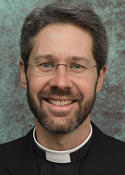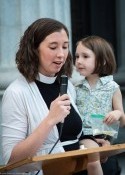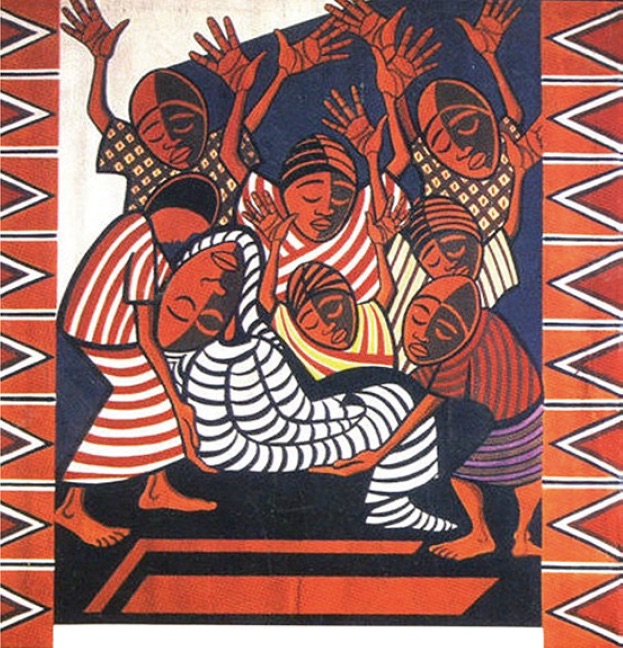From the Rector
When I first arrived at All Souls as the Rector in 2008, it was quickly clear to me that I had a lot to learn. What was most alarming was the sense that I didn’t even know what I didn’t know. So I set to work finding other practitioners in the area who were new in their calls, were interested in the study of congregational leadership, and were themselves striving to be healthy and stable.
And so, for the past seven years I’ve been meeting monthly with a group of other Rectors, reading and talking about change processes, structures of congregational life, and the unexpected challenges and joys of leadership. One of the books that we’ve been recently working through is a book from the end of the 20th century (that sounds like so long ago, but actually doesn’t feel that way at all), A Failure of Nerve, by Rabbi Ed Friedman.
It is a challenging book. I have found myself both arguing with Friedman and being stunned at his prescience. In 1999 he was warning that our culture was rapidly devolving into reactivity and that we were becoming data junkies, long before our political polarization had fallen to its current place, and before our magic rectangles could give us millions of bytes of information but few real answers.
Built off of the work of Dr. Murray Bowen, and the genre of Bowen Family Systems Theory, there is much that has been instructive and, again, challenging about Friedman’s premises. He writes the notion of immune systems in congregations, as I’ve previously written about in the Pathfinder, and in general of the critical need for self-differentiated, self-regulating, emotionally connected living.
One of the topics that we discussed in our group was about over-functioning in a relationship, whether in a family, a team, or an organization. Our conversation got real, though, when we started talking about a mundane task that we are all familiar with: doing the laundry.
One colleague expressed their amazement when visiting a friend’s house and seeing their elementary-school aged children doing their own laundry. They can do that? It wasn’t about the physical actions—children can measure, learn to sort, and physically press the right buttons and move the clothes around. It was more about the notion that they could themselves be responsible for this action that floored my friend. Another colleague weighed in that they could never see that happening in their house, their kids couldn’t possibly keep their clothes as clean as they needed to be.
What surfaced in our conversation was the often unseen effects of over-functioning. When a person or group over-functions, the work can get done, but in the process, one person overworks, often thereby growing exhausted. If the pattern continues long enough, the one over-functioning can grow resentful for the time and effort that they are giving, over and above the rest of their duties.
But there is another, more subtle effect in a systemic pattern of over-functioning: what Rabbi Friedman calls dis-integration. A healthy person or system is constantly working towards its own integrity, or wholeness. However, when we take on tasks, or articulate feelings, or do other work that really can or needs to be done by another, we are slowly making them dependent on our actions or emotions. Despite what can be our best of intentions, we are taking away from their wholeness, we are dis-integrating them, by doing what needs be done in order to be healthy, functional, whole people or groups.
When you use this as a lens, it becomes evident in many places in our society—partners who feel powerless to make decisions without their spouse approval, college students who show up feeling unable to function without the direct support of their family’s home, groups that feel incapable of taking action without the authorization of their leader.
Creating and maintaining environments that provide for self-differentiated, integrative behavior does not happen immediately. Ten year olds need instruction, practice and support so that red shirts aren’t washed in the hot cycle with white underwear. But in time, with intention and patience, elementary-aged kids can actually do their laundry. And much more. People can become aware of their own emotions. Groups can take active parts in setting direction and following through to a desired outcome. All possible, if we are but ready to stand alongside and let them.
Peace,
Phil+
Faith Against Coal
Last Tuesday afternoon, All Soulsians joined people from many different faith communities on the steps of Oakland City Hall. Together, we voiced our opposition to the proposal of exporting coal through Oakland.
“No community, rich or poor, should endure the effects of coal. But the environmental inequity of the coal terminal proposal cannot be disregarded,” said Rev. Kenneth Chambers, pastor of West Side Missionary Baptist Church in Oakland. “West Oakland already bears a disproportionate burden of pollution, of toxic contamination from diesel exhaust spewing from thruways crisscrossing through the community. Life expectancy of West Oakland residents is far below the life expectancy of residents in the Oakland hills, and West Oakland tenants are twice as likely to visit emergency rooms for asthma as the rest of Alameda County. The West Oakland community cannot afford to have any more pollution dumped on us. We ask the City Council to stand with us over polluters and profits.”

Baptist, Lutheran, United Church of Christ, Roman Catholic, Unitarian Universalist, Episcopal, Buddhist, Methodist, Islamic, and Jewish leaders and members of these communities gathered to pray, sing, and reflect together on the ways that all our faiths call us to be good stewards of the earth. That evening, the Oakland City Council tabled the proposal to move forward with considerations for exporting coal through Oakland, a step in the right direction. You can read more about the effort from the Episcopal News Service.
Photos by Brooke Anderson Photography.
Stations of the Cross
A Global Window into Christ’s Passion
This past Christmas Eve, Phil preached using images of the nativity from around the world. Rooted in the story of our stained and painted glass Nativity, now found in the chapel, he invited us to explore the way we ourselves enter the story. By taking in images that were both familiar and also very, very different from how many of us see the Holy Family in our mind’s eye, the story was opened in a new way.
Phil’s sermon resonated for many in the Arts at All Souls group and planted the seed to explore other cultures’ visual interpretations of Christ’s Passion. The result is this year’s installation of the Stations of the Cross, which is now hanging throughout the sanctuary. We join Christians all over the world in walking the Way of the Cross, and our unity in this pilgrimage is made more explicit by these diverse images. A devotional booklet is available to guide your prayer, or you may simply set out on the journey yourself, ready to pay attention and see what you discover.
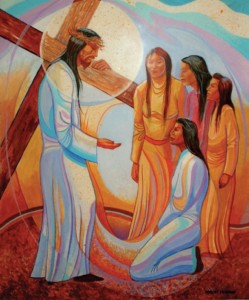
Station IX: Jesus meets the women of Jerusalem. Title unknown, Lakota Artist, Pine Ridge Indian Reservation, South Dakota
THE BEGINNINGS OF A MONEY AUTOBIOGRAPHY
Recently, Mary Rees reflected on this year’s vestry retreat, one part of which was beginning to create our own money autobiographies. Over several issues of the Pathfinder, we’ll be sharing the questions we engaged. They are adapted from Elizabeth O’Connor’s prompt in “Scattered Pilgrims.” We invite you to sit with the questions, write about them, talk about them, pray with them.
Do you feel generous or stingy with your money? Do you spend money on yourself? If so, do you do it easily?
Do you gamble with your money? Do you worry about money?
When you eat out with friends and there is a group check, are you the one to pick it up? Do you make sure that you pay your share, and that it includes tax and tip?
Do you tend to be more on the giving end of things, or on the receiving end? If you lacked money, how would you feel about others helping you pay your rent, or treating when you went out and were not in a position to reciprocate?
Announcements
In thanksgiving for the life of Lewis Patton
A Memorial Service for Lew Patton will be held at All Souls on Saturday, March 5th at 11am, with a reception to follow.
All Souls for Racial Justice
March 3rd at 7:00 pm All Souls for Racial Justice will meet in the Parish House. Join us to talk about where we are and where we want to go. There are so many opportunities to get involved in exciting work right now! If you have any questions contact Danielle Gabriel at 510.332.0631 or by email.
Lenten Series
Join us at 6:30 pm on Wednesday evenings during Lent for a soup supper and our Lenten Series. Our program this year is “Entering the Seasons of the Soul” and will use the liturgical year, art, scripture, and practice, led by the Rev. Suzanne Guthrie. If you are able to help provide soup or bread for one of the suppers, please contact Jeannie Koops-Elson or sign up here.
We Do Not Walk Alone: a resource for suicide prevention
On February 28th, All Souls will host We Do Not Walk Alone: A Resource for Suicide Prevention. All youth and those who love them are welcome. Join us in the Parish Hall from 1:00 – 4:00 pm. James Kirkham, Supervisor at Seneca Family of Agencies, and Alicia Hooton, Executive Director of Crisis Services at Seneca Family of Agencies, will lead this suicide assessment and prevention training. Contact Jess Powell for more information or to RSVP.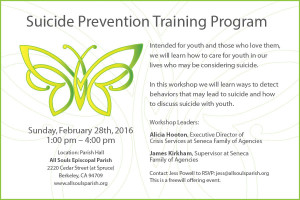
Upcoming Events with the Phoenixes, our 20s and 30s group:
– Saturday February 27, 10:00 – 11:30 am: Brunch and Bible Study in the Parish House (across the parking lot from the church)
– Friday March 4, 7:00 – 8:30 pm: Taizé Service (a time of beautiful meditative music, short prayers, time for silence and reflection, based on the tradition of the Taizé community in France) followed by munchies and conversation in the All Souls chapel (along Cedar St.)
– Saturday March 12, 10:00 – 11:30 am: Brunch and Bible Study in the Parish House.
Email Erica Clites or Emily Hertz to learn more.




